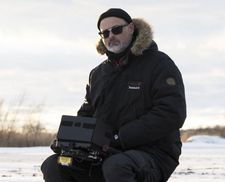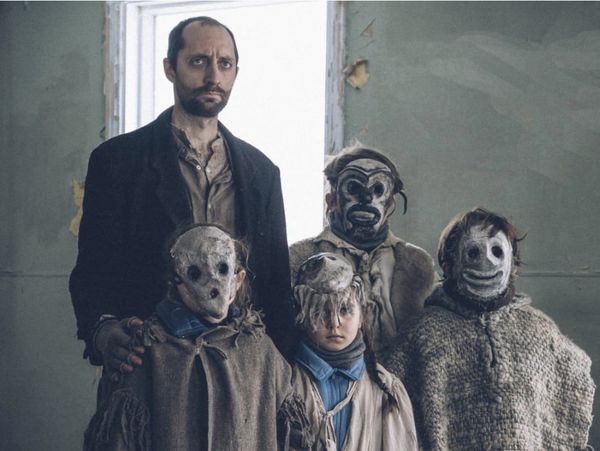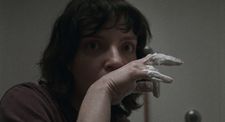 |
| Robert Naylor as Jimmy Dubé in Ghost Town Anthology. Denis Côté: 'I like to watch films that are open objects with no real ending. It's just ideas floating' |
“There's a real schizophrenic energy going on, I agree,” says Côté as I sit down to speak to him at Karlovy Vary Film Festival last year. “When I write something like Curling or Vic + Flo Saw A Bear, it's a $2 million budget, 25 people, a producer, a distributor, some pressure – everything needs to be tight, schedule-wise. It’s like a military operation, and I'm happy to write dialogues and direct professional actors. But when it's over, I need to take my revenge over that. Three people, a car, no script, we go to the zoo, we do Bestiaire. Or three people, a car, I find six bodybuilders and we make A Skin So Soft. Zero scripts. I don't even have notes in my hand. And then you write the film while editing.”
 |
| Denis Côté: 'I like my scripts to be a bit like a huge snake; you don't know where it ends' Photo: Courtesy of KVIFF |
Some filmmakers are reticent to reveal the allegorical meaning in their work, but Côté isn’t one of them. With little probing, he explains it’s all a metaphor for Quebec. “Quebec is seven million French-speaking people surrounded by an ocean of Anglophilia: English–Canada and the States. We love to say that they are our neighbours, but we don't really connect well with them. And then we like to say we have a European edge, but that's not really true. So in the end, we are Anglo-Saxons speaking French, which is quite unique.”
This uniqueness, Côté reckons, is a reason for the rude health of the arts in Quebec, including a film scene so diverse as to produce such internationally celebrated directors as Denis Villeneuve, Xavier Dolan and Jean-Marc Vallée, to name a few. “We've been surviving culturally since forever, so we overproduce cinema, we have our own singers, we have our little star system – and for only seven million people. So we act very arrogantly when we are together.”
 |
| Ghost Town Anthology director Denis Côté on his quick work rate: 'I can't understand these filmmakers making one film every five years' Photo: Courtesy of KVIFF |
Not everyone is on board with Ghost Town Anthology’s deeper meaning, though, and that’s OK with Côté. “When I'm in Q&A's, and I start talking about immigration, some people are like, ‘I didn't see that in the film, I thought they were just zombies.’ But that’s great, you know? It means the film isn’t one dimensional, it's open. I like to watch films that are open objects with no real ending. It's just ideas floating.”
What hits you first about Ghost Town Anthology isn’t its political undercurrents, it’s the sandblasted aesthetic. The handheld 16mm cinematography is full of scratches and grains. So scuzzy and shaky is the image that at some points you might be under the impression the snow-covered town is in the middle of a blizzard. As Côté himself puts it, the banged-up celluloid “looks like an old postcard somebody peed on”. The startling look of the film developed from Côté’s idea of a culture in danger of fading away. “I said to my DP [François Messier-Rheault], ‘OK, so this world is becoming residual, give me something that is about to disappear; shoot the film in a way that we always feel like the film will be destroyed.”
 |
| Larrisa Corriveau as Adèle in the film. Denis Côté: 'We didn’t clean the film stock, we kept the dust, we kept the imperfections' |
Like all of Côté’s work, Ghost Town Anthology doesn’t play out to conventional film rhythms or conform to genre movie cliches. Perhaps his films’ feel so unpredictable because they’re unpredictable to Côté too as he sits down to write them. “I do something that is very dangerous when I write,” he explains. “I go page after page and I don't know what's coming. I've always done that. I like my scripts to be a bit like a huge snake; you don't know where it ends. And for this film in particular, it was even harder because I had ten characters, so you don't know which characters are important until you start writing.”
Ghost Town Anthology is Côté’s 12th film in 14 years. Since its premiere at last year’s Berlinale, he’s already released another film, Wilcox, a documentary following an ex-soldier living itinerantly in a Quebec forest. Don’t expect him to slow down any time soon. “I can't understand these filmmakers making one film every five years,” he scoffs. “They always go for the masterpiece and usually fail. My films are always” – he searches a few seconds for the right word – “...tentative. It's never a masterpiece, it's just a new thing.” He tells me he sees his body of work as being like a wall: “There are small bricks and there are big bricks, but it's still just a wall. And I'm fine with that. I don't need to make my masterpiece every five years and fail – it must be terrible.”
Ghost Town Anthology is streaming on MUBI until 21 May





















